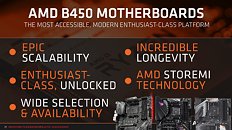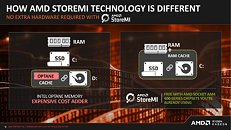- Joined
- Oct 9, 2007
- Messages
- 47,322 (7.52/day)
- Location
- Hyderabad, India
| System Name | RBMK-1000 |
|---|---|
| Processor | AMD Ryzen 7 5700G |
| Motherboard | ASUS ROG Strix B450-E Gaming |
| Cooling | DeepCool Gammax L240 V2 |
| Memory | 2x 8GB G.Skill Sniper X |
| Video Card(s) | Palit GeForce RTX 2080 SUPER GameRock |
| Storage | Western Digital Black NVMe 512GB |
| Display(s) | BenQ 1440p 60 Hz 27-inch |
| Case | Corsair Carbide 100R |
| Audio Device(s) | ASUS SupremeFX S1220A |
| Power Supply | Cooler Master MWE Gold 650W |
| Mouse | ASUS ROG Strix Impact |
| Keyboard | Gamdias Hermes E2 |
| Software | Windows 11 Pro |
AMD today announced the B450 motherboard chipset for socket AM4 processors and APUs. Positioned as the mid-range option from AMD's 400-series chipset family, the B450 will power motherboards priced anywhere between $70 to $160, and packs certain high-end features that could let you save money over choosing pricier X470-powered boards. To begin with, the B450, like the X470, has a lower TDP and power-draw, so it runs cooler, and can make do with lighter heatsinks. It comes with slightly improved reference CPU VRM and memory wiring specifications that AMD introduced with the X470. The B450, like the X470, also supports XFR 2 "Enhanced" and Precision Boost Overdrive (that lets you tinker with boost frequencies without arbitrarily setting a high clock speed).
The B450 is recommended by AMD for both Ryzen 5 series and Ryzen 7 series, provided you don't need multi-GPU, as motherboards based on B450 aren't allowed to have PEG lane bifurcation. You still get multiplier-unlocked CPU overclocking support (something the competing Intel B360 platform lacks), as well as memory overclocking. The B450 packs out of the box support for AMD StoreMI, a storage virtualization feature that stripes a portion of your memory, your fast SSD, and slower HDD, into a single volume, and juggles hot data in and out of the faster media in the background. You can have any brand of drives to use StoreMI. B350 motherboards support StoreMI through BIOS updates.




The rest of the B450's feature-set is identical to that of the B350. The chipset is wired to the AM4 SoC over a PCI-Express gen 3.0 x4 link. It puts out 6 PCI-Express gen 2.0 downstream lanes meant for onboard devices. This may seem less compared to the 12 gen 3.0 lanes put out by Intel B360, but is somewhat compensated by the higher number of PCI-Express gen 3.0 lanes put out by the AM4 SoC ("Summit Ridge" and "Pinnacle Ridge") than competing Intel processors. Ryzen processors put out not just 16 gen 3.0 lanes toward graphics cards, but also a gen 3.0 x4 link meant for NVMe SSDs, and the a second gen 3.0 x4 link serving as chipset-bus (a total of 24 lanes).
The B450 chipset puts out two 10 Gbps USB 3.1 gen 2 ports, six 5 Gbps USB 3.1 gen 1 ports, and six SATA 6 Gbps ports. The motherboard's PCIe network controllers (GbE and WLAN) are usually wired to the chipset's PCIe gen 2.0 ports.
The B450 supports every socket AM4 processor and APU launched till date, and AMD reassures that the AM4 platform will see additions all the way till 2020 (i.e. even products launched in 2020 will be supported on older chipsets through BIOS updates).
View at TechPowerUp Main Site
The B450 is recommended by AMD for both Ryzen 5 series and Ryzen 7 series, provided you don't need multi-GPU, as motherboards based on B450 aren't allowed to have PEG lane bifurcation. You still get multiplier-unlocked CPU overclocking support (something the competing Intel B360 platform lacks), as well as memory overclocking. The B450 packs out of the box support for AMD StoreMI, a storage virtualization feature that stripes a portion of your memory, your fast SSD, and slower HDD, into a single volume, and juggles hot data in and out of the faster media in the background. You can have any brand of drives to use StoreMI. B350 motherboards support StoreMI through BIOS updates.




The rest of the B450's feature-set is identical to that of the B350. The chipset is wired to the AM4 SoC over a PCI-Express gen 3.0 x4 link. It puts out 6 PCI-Express gen 2.0 downstream lanes meant for onboard devices. This may seem less compared to the 12 gen 3.0 lanes put out by Intel B360, but is somewhat compensated by the higher number of PCI-Express gen 3.0 lanes put out by the AM4 SoC ("Summit Ridge" and "Pinnacle Ridge") than competing Intel processors. Ryzen processors put out not just 16 gen 3.0 lanes toward graphics cards, but also a gen 3.0 x4 link meant for NVMe SSDs, and the a second gen 3.0 x4 link serving as chipset-bus (a total of 24 lanes).
The B450 chipset puts out two 10 Gbps USB 3.1 gen 2 ports, six 5 Gbps USB 3.1 gen 1 ports, and six SATA 6 Gbps ports. The motherboard's PCIe network controllers (GbE and WLAN) are usually wired to the chipset's PCIe gen 2.0 ports.
The B450 supports every socket AM4 processor and APU launched till date, and AMD reassures that the AM4 platform will see additions all the way till 2020 (i.e. even products launched in 2020 will be supported on older chipsets through BIOS updates).
View at TechPowerUp Main Site






